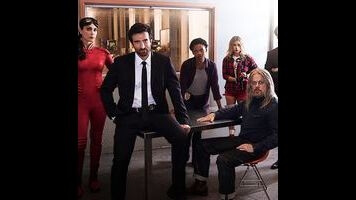An adaptation of Brian Michael Bendis and Michael Avon Oeming’s comic book Powers has been in the works for over 10 years, with Sony Pictures first optioning the series for a film in 2001. A decade later, Sony and FX teamed up for a Powers pilot starring Charles S. Dutton, Lucy Punch, and Jason Patric, with a script by Charles H. Eglee, a veteran TV writer whose credits include St. Elsewhere, Moonlighting, The Shield, and current comic-book adaptation phenomenon The Walking Dead. That version of the concept never went to series, but in March of last year, Sony announced that a new Powers would debut on PlayStation Network, a first for the platform and a bid to compete with the original programming offered by streaming services like Netflix, Hulu, and Amazon.
All those years in development have resulted in a product that is considerably different than the comic. The basic premise is still the same, telling the story of cops operating in a world of superheroes, but the setting has been changed from Chicago to Los Angeles, leading to a greater emphasis on the celebrity aspect of Powers’ superhuman figures. (The first episode features an exposition info-dump courtesy of Mario Lopez on an episode of Extra.) Rather than tackling individual storylines from the comic, the TV series combines a plethora of different Powers plots into one narrative, delivering scripts that have a lot of familiar elements for fans of the comic, but don’t unfold the way readers would expect.
At the center of it all is Christian Walker (Sharlto Copley), a former superhero who became a detective for the L.A.P.D. Powers Division after losing his abilities. The TV show’s interpretation of the character is considerably more angsty than the comic: Christian’s television persona doesn’t have the same imposing presence as his comic-book one, drawn with a hulking build and square jaw. TV Christian is also cursed with a horrible approximation of an American accent from South African-born Copley. Both Copley and Noah Taylor, who plays teleporting villain Johnny Royalle, have immense difficulty capturing a natural American dialect, and there’s a cartoonish exaggeration to their vocals that is consistently distracting. Copley in particular likes to growl his lines, and it’s hard to connect with the character when most of his very serious dialogue is performed in such an over-the-top manner.
Many of the characters have been significantly altered from their comic-book personas, particularly the women. Christian’s new partner Deena Pilgrim (Susan Heyward) is a combination of his two comic-book partners, maintaining Deena’s attitude but given the appearance and backstory of Enki Sunrise, a character introduced in the third volume of Powers. Heyward is far and away the best part of the series; she has a cool demeanor and great comic timing, and does most of the heavy lifting when it comes to building Deena and Christian’s relationship. Copley’s performance is very insular, but Heyward is an actress that gives a lot to her scene partner, which goes a long way to creating chemistry between the two cops.
Retro Girl (Michelle Forbes), who is murdered in the first issue of Powers, is very much alive in this series, and plays a significant role in the investigation at the core of the TV show. Her relationship with fangirl/superhero wannabe Calista (Olesya Rulin) is the show’s most effective way of showing how these heroes impact the lives of regular citizens, and Forbes, a veteran of genre television, brings a lot of gravitas to her character. She does strong work balancing Retro Girl’s noble intentions with a slightly selfish, vindictive edge, revealing how fame gets in the way of heroism.
Directing the first two episodes, David Slade makes the most of a clearly limited budget. The special effects aren’t on par with other superhero shows like The Flash, but fantastic elements aren’t the focus here. The gritty atmosphere of the comics is maintained with Slade’s direction, and the design team does strong work establishing a contrast between the polished, colorful world of the celebrity powers and the bleaker environment of the cops and younger superhumans. There’s a homemade quality to the costuming for the lesser heroes like Logan Browning’s Zora, and while these costumes do look cheap, that’s also the point.
The first three episodes of Powers land on PSN on March 10, and the pilot will be available for free on Tuesday at PlayStation.com/Powers. Unfortunately, the pilot is the weakest of the three episodes, suffering from a classic case of “show, don’t tell.” The dense history of these characters is presented in large chunks of exposition like the aforementioned Extra sequence, and writer/executive producer Charlie Huston struggles to present all the information in a way that isn’t awkward and clunky.
The quality improves once the background details are covered, and the third episode, the first not written by Huston, is when the momentum really starts to build. It offers major developments for Walker’s imprisoned archnemesis Wolfe (a very naked, very creepy Eddie Izzard), and introduces Triphammer, the armored hero played with chilling intensity by Upstream Color’s Andrew Sensenig. Powers is at its best when it’s not focusing on Christian Walker, who unfortunately is the series’ main character.









































